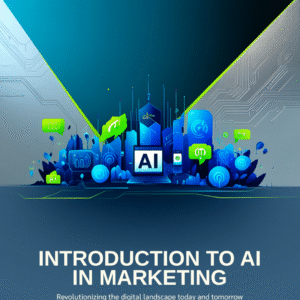
Introduction
In today’s fast-paced digital world, where data is abundant and consumer expectations are constantly evolving, businesses are increasingly relying on AI in marketing to gain a competitive edge. No longer a futuristic concept, AI in marketing has become a powerful reality reshaping how brands interact with customers, personalize experiences, and optimize campaigns. This blog provides a comprehensive introduction to AI in marketing, its key benefits, practical applications, and how it’s shaping the future of digital marketing.
What Is Artificial Intelligence in Marketing?
AI in marketing refers to the use of artificial intelligence technologies such as machine learning, natural language processing (NLP), and predictive analytics to automate, analyze, and improve marketing tasks. By leveraging AI in marketing, businesses can make data-driven decisions, create hyper-personalized customer journeys, and efficiently automate repetitive processes enhancing both performance and customer satisfaction.
Why AI Matters in Modern Marketing
With billions of interactions happening online daily, traditional marketing methods often fall short of delivering personalized, timely, and relevant experiences. AI in marketing steps in to close that gap by offering:
• Efficiency: Automating tasks like email marketing, content recommendations, and ad targeting.
• Accuracy: Reducing human error and providing data-backed insights.
• Scalability: Managing large volumes of data across multiple platforms.
• Speed: Delivering real-time decision-making for dynamic marketing strategies.
lass=”yoast-text-mark” />>By leveraging AI in marketing, businesses can not only enhance productivity but also provide a more tailored and engaging experience to each user.
Key Applications of AI in Marketing
AI in marketing is transforming how brands interact with consumers by enabling highly personalized and data-driven campaigns. One of the most impactful applications is personalized marketing, where AI allows marketers to segment audiences based on behavior, preferences, and real-time interactions. This makes it possible to deliver tailored emails, product recommendations, and content that align with each customer’s journey—just like Netflix and Amazon, which use AI to boost engagement and conversions by recommending shows or products based on user behavior.
Another major use of AI is in chatbots and conversational marketing. AI-powered chatbots, equipped with natural language processing (NLP), can handle customer queries 24/7, offer instant support, qualify leads, and assist customers in e-commerce environments. This not only improves user satisfaction but also allows human agents to focus on more complex tasks.
AI also empowers marketers through predictive analytics, helping them forecast future customer behavior based on historical data. This includes predicting sales trends, identifying high-value customers, estimating churn rates, and determining the best time to send emails or offer personalized product deals.
Additionally, AI in content creation and optimization is revolutionizing how marketers produce material. Tools like ChatGPT and Jasper can generate blog topics, ad copy, headlines, and even video scripts—allowing brands to scale their content efforts efficiently without sacrificing quality.
Finally, programmatic advertising leverages AI to automate the buying of digital ads in real-time. This ensures that ads are served to the right audience, at the optimal time, and in the most relevant context—resulting in better targeting, reduced ad spend, and significantly higher ROI.
Benefits of Using AI in Marketing
AI in marketing significantly enhances the customer experience by ensuring that the right message reaches the right person at precisely the right time. This level of personalization fosters deeper engagement, customer loyalty, and overall satisfaction. Moreover, AI boosts marketing efficiency by automating repetitive tasks such as scheduling social media posts or handling common customer queries through chatbots, allowing marketers to concentrate on strategic planning and creative execution. One of the greatest advantages of AI lies in its ability to analyze vast amounts of data quickly, enabling faster and more accurate decision-making based on actionable insights. While adopting AI tools may involve an upfront investment, the long-term benefits—such as automation, smarter targeting, and process optimization—lead to substantial cost savings and improved return on investment.
Tools and Platforms Powering AI in Marketing
Here are some popular AI tools that marketers are using:
| Tool Name | Use Case |
| HubSpot | AI-powered CRM & automation |
| Jasper AI | Content generation |
| ChatGPT | Conversational marketing, copywriting |
| Grammarly | AI-based content editing |
| Hootsuite Insights | Social listening and analytics |
| Google Ads Smart Bidding | AI for optimized ad performance |
Real-World Examples of AI in Marketing
- Coca-Cola
Uses AI to analyze consumer preferences and create new product flavors based on data insights from social media and vending machines.
- Sephora
Uses chatbots and AI-driven product recommendation engines to personalize the beauty shopping experience.
- Spotify
Leverages machine learning to generate curated playlists based on individual listening habits.
These examples show how brands across industries are harnessing AI to deliver more personalized, timely, and effective marketing strategies.
Challenges and Considerations
While the benefits of AI in marketing are substantial, it’s equally important to acknowledge the challenges that come with its implementation. One of the primary concerns is data privacy and ethics. Marketers must ensure that their AI tools comply with regulations like the GDPR, maintaining transparency in how data is collected and used, and always securing user consent. Additionally, there’s a steep learning curve associated with adopting AI technologies. For small businesses or those new to digital marketing, the technical knowledge required can be a barrier to effective integration. Another significant challenge is the dependence on high-quality data. AI systems rely heavily on clean, accurate, and relevant data to function properly. Inadequate or poor-quality data can result in misleading insights, ultimately affecting marketing outcomes.
The Future of AI in Digital Marketing
The future of AI in marketing looks incredibly promising, driven by several key advancements. Voice search optimization will become increasingly important as smart assistants continue to grow in popularity, making it essential for marketers to tailor their strategies for voice queries. Visual recognition technology will advance, allowing AI to analyze images and videos more effectively, which will enhance personalization in visual content. Additionally, AI will enable hyper-personalization by delivering marketing messages tailored to real-time behavior and context, creating more relevant and engaging customer experiences. Automated campaign management will also evolve, allowing marketers to automate entire campaigns—from planning through execution—saving time and increasing efficiency. As these technologies continue to develop, marketers who adopt AI early will be better positioned to stay ahead of the curve and meet the rising expectations of their customers.
